Thoughts on Richard Parkes
After the retirement of Richard Parkes as pipe-major of Field Marshal Montgomery is a significant moment in pipe band history.
The 72 RSPBA major championships, including 13 World Championship titles and 15 RSPBA Grade 1 Champion of Champions awards, gained over his 43-year tenure make him, without question, the most successful competitive pipe band leader ever.
Moreover, FMM has finished second at the World’s 12 times since its first win in 1992. That’s a gobsmacking 25 out of 31 attempts that the band was first or second under Richard Parkes.
We asked several people who aren’t often vocal on social media for their thoughts about Richard Parkes, and we appreciate their contributions to help mark the historic occasion.
Jenny Hazzard, FMM piper since 2017
![Jenny Hazzard hugs her mother, Evelyn, after FMM won the 2022 World Championship. [Photo Mae Mackay]](https://www.pipesdrums.com/storage/2024/09/Hazzard_Jenny_Ev_Hazzard_Worlds_2022_FMM.jpg)
Playing in Field Marshal under Richard’s leadership has been such an enormous learning experience. Watching his methods, his scrupulous scientific approach and meticulous application of what can only be described as a “tone system” has been fascinating. People ask a lot of questions about how he does it and what is the secret to the band’s success. I would say, possibly as important as that incredible drive, is the precision and consistency of the system he has worked out and refined for many years. Everyone knows exactly what they need to do, exactly when, and exactly how. Everyone has a complete understanding that they must turn up prepared, follow the system, and watch him constantly. A friend observed to me after the World’s this year that it was so interesting to see how, during our preparation, Richard rarely needed to say anything. A small hand gesture or look is often the only signal required to let everyone know what they need to do.
He absolutely does not shout or swear, or even raise his voice much at all. But oh, yes, he is scary. The look is all it takes. – Jenny Hazzard
People also often ask if Richard is really scary. Does he shout and swear at people when they mess up? I can only vouch for the past eight years, but in my experience, He absolutely does not shout or swear, or even raise his voice much at all. But oh, yes, he is scary. The look is all it takes. A bit of a clench to the jaw and tilt of the head, and eyes that say, “Why on earth am I having to explain this?”
In my first year in the band, at the end of the World’s Friday, as we were packing up our pipes and getting ready to head off, Richard must have said (probably a couple of times) what the plans were for meeting the following morning. I was new and hadn’t fully grasped all the important rules yet, and a few minutes later, I made the rookie error of asking, “What time did you say for tomorrow?” I remember kind, lovely Ruth Parkes looking humorously horrified and actually putting her arm around my shoulders and directing me away from him, as his eyebrows shot up at the idea that someone had not been properly listening. It was funny, but not funny – a lesson in an important aspect of the “system” – always listen, always pay attention. No one wants to be on the receiving end of that look.
Richard Parkes commands respect in a way that’s difficult even to fathom. He’s quiet, softly spoken, and, I would say, quite introverted and shy – probably not what people would typically expect as characteristics for a leader with unrivalled success over decades. But there’s no doubt he is made of steel. Imagine suffering a stroke in your mid-forties and being unsure if you’d ever even be able to play the pipes again, and through belief and determination and drive, not just playing but winning the World’s that same year and nine more since then.
Whatever magic he’s got inspires people to work, try, strive, do anything they can to be great – for themselves and their own success, yes, but in a very big way, for him.
I feel so incredibly lucky to have had the opportunity to experience what it’s like to play in FMM under Richard Parkes. Standing in that circle when everything is going right and the sound shifts into gear is an unforgettable feeling. The musical powerhouse he created is one of a kind, and it’s so special to be part of it. It’s also wonderful to know that, because of what he’s established and built over the years, because of the system he’s developed, it will carry on and continue to achieve greatness. The foundations are deep.
For Richard, I’m sure this will be such a strange time. He has poured his heart and soul into FMM for what must seem like forever, and stepping away from it will be a massive adjustment. We’ll all miss him so very much, but will all continue to be glad and grateful to call him a friend. I’m also waiting for updates on when he cracks the sub-20-minute 5k run (he’s already come close, for those unaware), and Ruth can keep us updated on how much time he’s spending watching the new season of Love Island.
Thank you, Richard, for everything, more than I can possibly express.
Alex Gandy, 78th Highlanders (Halifax Citadel) pipe-major and former FMM member
I was fortunate to play with Richard and FMMPB in 2007 and 2008. My audition started unknowingly at one of my last amateur contests, the 2006 Metro Cup. Alastair Dunn judged me and found out I was planning to move to Scotland, work for the year, and fully immerse myself in piping.
Before meeting Alastair, who was FMM’s pipe-sergeant at the time, I didn’t even know that playing Field Marshal would be an option. I thought that living in Scotland meant I had to join a Scottish band. Thankfully, Alastair informed me of the Scottish contingent he was leading then. FMM was officially on the table as an option and very quickly became my #1 choice.
Fast forward to the fall of 2006 and I had a mountain of music to learn quickly as the band was doing a concert at Celtic Connections in January 2007. Practice with the band started in October 2006. It is a good thing that my life was devoted to piping at the time; the concert kickstarting things led to an outstanding season, winning four of the five majors, including a World Championship. We also did the Pre-World’s Concert that year, which I was thrilled to be a part of.
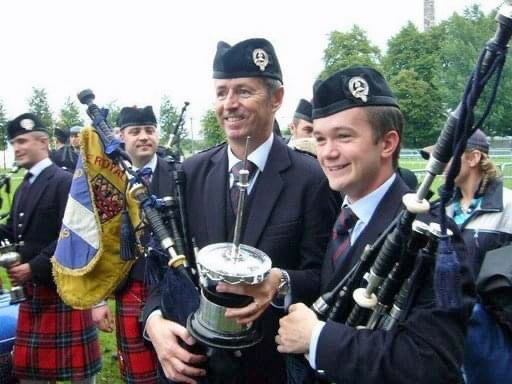
Joining the band and learning “how it’s done” was and continues to be a tremendous part of my journey. I regularly reflect on how I remember things at practice, the expectations, and the commitment to greatness. I had never been in a situation where you had to strive for perfection at every practice. No loose hemp. Tape had to be 100% perfect every time. Steady cane drone reeds were the only option. It was exceptionally hard work, but it was worth it when you got to play in the FMM sound.
My interactions with Richard were shared among the band, but a few things stand out as memories. One of the best was delivering bad news.
When Richard spoke, everybody listened. No chatting. No texting. No snare taps or shoe-shuffling. Even when frustration was voiced, he would look in the direction of who was likely the culprit but never singled people out in front of the whole group. You would know if it was you by the end of practice but never felt singled out. Every leader is good at telling their band when things are going great. Telling a group that things aren’t going well in an effective manner is much tougher.
“Being in FMM meant you were a representative of his and you had to walk the walk. If you were told to do 30 attacks a day, you did it.” – Alex Gandy
His unwavering pursuit of greatness changed the way I look at piping. The whole experience did. Being surrounded by professionals was new for me. They all knew exactly how their pipe would behave and would not be the ones making mistakes. Richard commanded a level of respect, determination, and commitment. Being in FMM meant you were a representative of his, and you had to walk the walk. I still tell my band I would never tell them to do something I’m not doing myself. That mindset came from watching the leaders at FMM. If you were told to do 30 attacks a day, you did it. The leadership was doing it, too.
Richard’s competitive stats speak for themselves. They are unlikely to be matched at any time soon. My time in FMM was great from a competitive standpoint, but the wins aren’t what made me better. They were enjoyable, of course. I was thrilled to win the World’s Trophy 20 years after my father and the 78th Fraser Highlanders took it in 1987. This summer I realized that it was half of my life ago when I was there playing. It’s a slightly tough pill to swallow, but having been there to be a part of the well-oiled machine that is FMM is better than not.
Being a member of what I still think is the World’s greatest band is something I’ll be proud of indefinitely. I was a member for two seasons but always felt a connection and always cheered for their success. Thank you to the entire band for the music and experience. Thank you to Richard for being in charge for so many years and bringing the amazing product forward over and over. I hope Richard and Ruth enjoy the next chapter and a likely overwhelming demand for Richard’s expertise at workshops and competitions.
Emmett Conway, former FMM piper and now pipe-major of Shotts & Dykehead Caledonia
I am incredibly thankful for the opportunity to have played under Richard’s leadership for seven seasons (2009-’14 and 2017). He has been a role model for me and many others in the pipe band world, setting a standard of excellence that anyone would aspire to as a pipe-major. The overwhelming tributes on social media are a testament to the immense respect he has earned. What a living legend!
Richard, thank you for your outstanding service to pipe bands, and I wish you all the best in your retirement.
Terry Lee, former Simon Fraser University Pipe Band pipe-major and rival FMM competitor
From a Simon Fraser University perspective, we came through in the 1980s when we were all chasing the Strathclyde Police. This seemed impossible at the time, as they were a machine. Then, in the 1990s, along comes this band (for me) out of nowhere: FMM rocketing into Grade 1 and winning early on. Yikes, our hands were full once again! FMM produced such a bright sound and were pushing the envelope with exciting hornpipes to start and finish their medleys. Very impactful stuff.
They say that all good things must come to an end but with Richard you were never really sure. – Terry Lee
There was an entire decade (1999-2009) when the top three at the World’s were Shotts, SFU and FMM in varying order. I recall Shotts Pipe-Major Robert Mathieson musing at the time who would be first to retire, himself, Richard Parkes or me. I found it to be an interesting question, but in no way would I have predicted Richard would outlast us by more than 10 years! They say that all good things must come to an end but with Richard you were never really sure.
When I think of Richard Parkes, two traits come instantly to mind: competitor and tone-czar.
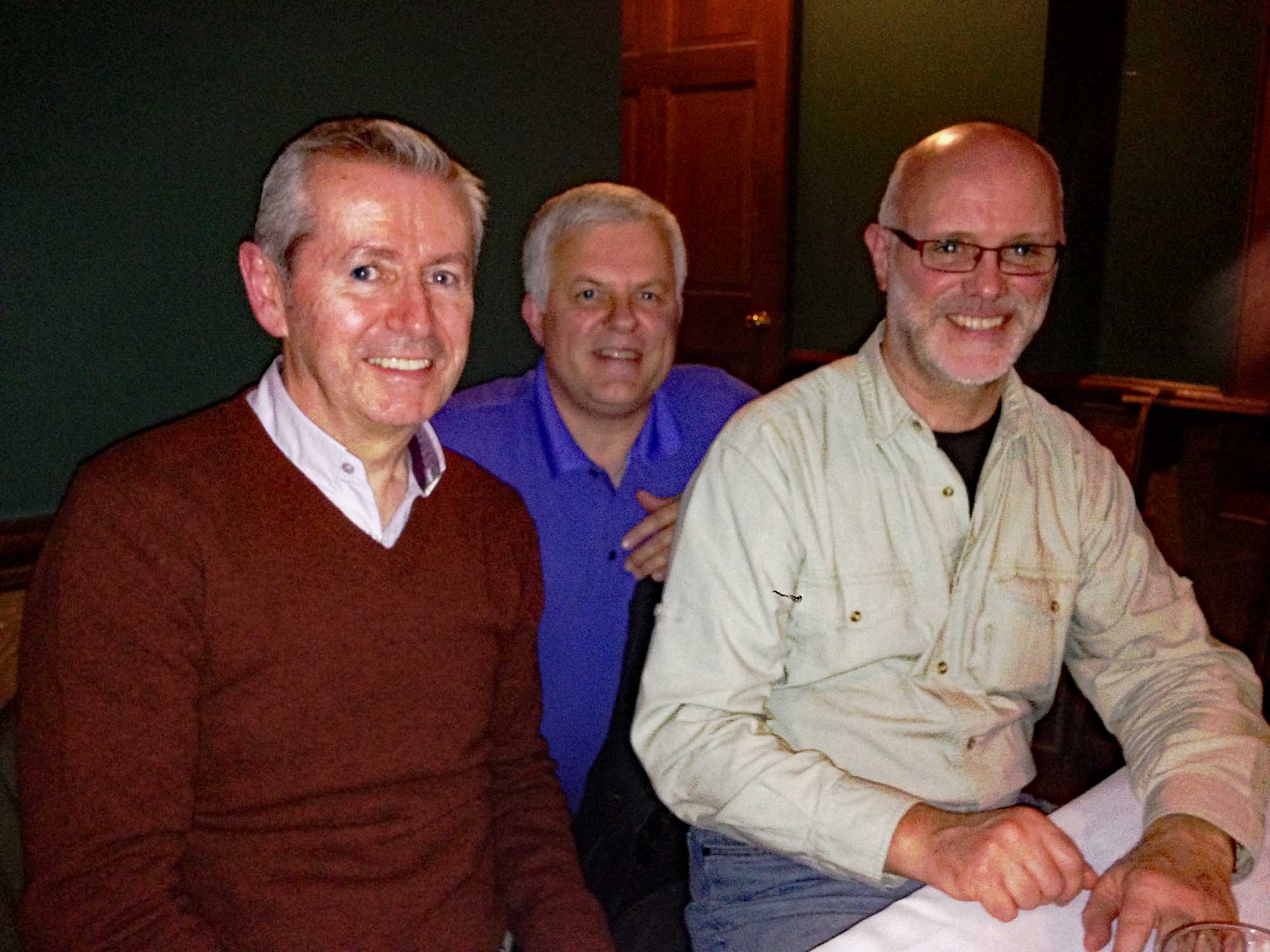
As a competitor, Richard always had his band prepared. When it was championship time, FMM were always ready. They always seemed to be at their best at the right time. This is what leadership is all about. That, and you could see him always learning and taking thoughts from what was going on with other bands, good and bad; always exploring but, mostly, always growing and improving. Richard either loved winning or hated losing – likely both. Losing seemed to fuel him. What a competitor.
Then there was sound. In the ’80s, the trend was for a big, booming sound and driving tempos. Richard set this on its head with his vision to focus on note accuracy and drone projection. The result set FMM apart. I think, as well, “the sound” seduced listeners and adjudicators alike. It was difficult to look past it as it was so pronounced and powerful. Along with this came a rise in chanter pitch that set bands on a new course. Flatness does not impress, but sweetness in sound is always pleasing to the ear. And so, bands today owe Richard for going next-level on sound, full stop.
On a personal note, Richard and I were always competitors while remaining good friends. A mutual respect was always there. Richard knows how sweet the first World’s win is. By 1995, we had been trying for a decade with several close second-place finishes. After finally winning that year, I will never forget Richard (and band members) coming to our digs for an all-night celebration. It was such a classy move and a night we will all remember.
Salute!
Keith Orr, FMM lead-drummer with Richard Parkes for 21 years
Richard and I go back a long way, probably from the early to mid-1980s. He played for me as a solo drummer and was the piper at my wedding in the late-’80s
I left the Grade 1 Royal Ulster Constabulary in 1984 and joined the Grade 2 Graham Memorial. Richard was then pipe-major of Field Marshal Montgomery, also in Grade 2. We had a healthy rivalry. Both bands were elevated to Grade 1 shortly after, and that rivalry continued.
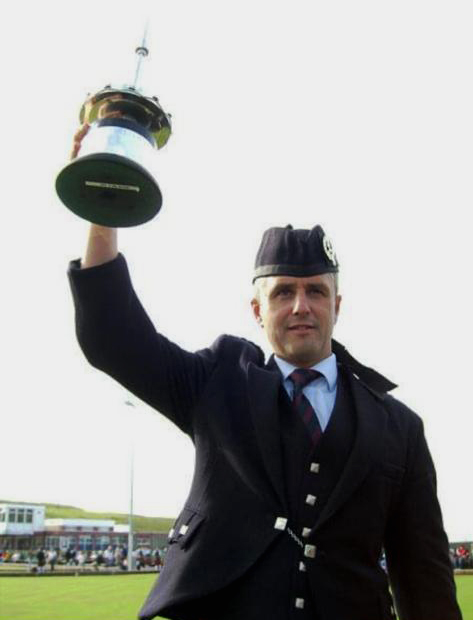
It wasn’t long before FMM started to show the credentials that would soon see them lift a major title – the 1991 Cowal Championship. This was followed by the band’s first World title in 1992.
I had moved to Grade 1 McNeilstown in 1993 under Pipe-Major Frank Andrews, who was my father-in-law. Both of us would play a major role in FMM in the coming years.
Richard and I worked extremely well together, forming a great partnership for the next two decades. The success that followed could never have been anticipated. There is far too much to list, but the major ones were 10 World Championships, two Grand Slam titles (winning all five majors in one season), 46 major championship wins, 13 RSPBA Champion of Champions titles, and multiple All-Ireland and Ulster Championship awards.
To achieve this sort of success consistently, a very special leader is required. Richard has certainly been that and more. He has been totally dedicated to the band in every way, and this dedication and commitment have paid off.
There are certain qualities required to be a successful pipe-major at the highest level. Richard has them all.
His attention to detail is finely tuned. Nothing is missed or overlooked. He has a vision of what things should look and sound like when new material is being worked out.
There is the man-management side of things, especially for a band with mor than 40 members, with players from different countries coming in at different times before and during a competition season. This is such a hard thing to orchestrate to start with, then you have the different personalities to work with on top of this.
This shows just what a huge undertaking this is and how time consuming a task it can be.
The list of tasks for a top pipe-major these days is endless, so I’m sure that, while Richard will sorely miss the position he has held for so long, he will also enjoy a step back from the huge commitment that that entails.
I’d like to thank Richard for my time in the band and I can safely say it’s been life changing. These were truly unbelievable years and achievements.
The trips to Australia with Heather and Ruth in 2013 and ’14 were a particular highlight.
It has been an honour and a privilege to go through this special journey with you and all the unbelievable times that we’ve had.
So, enjoy your retirement, Richard. and also all the best to Matt on his new role as pipe-major.
Our thanks once again for these contributions.
What are your thoughts? We always welcome your input via our Comments feature below.


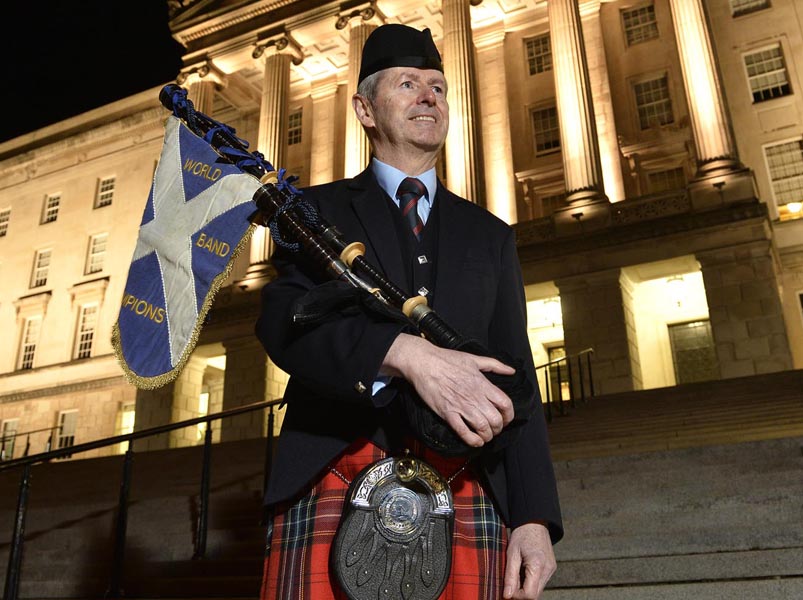
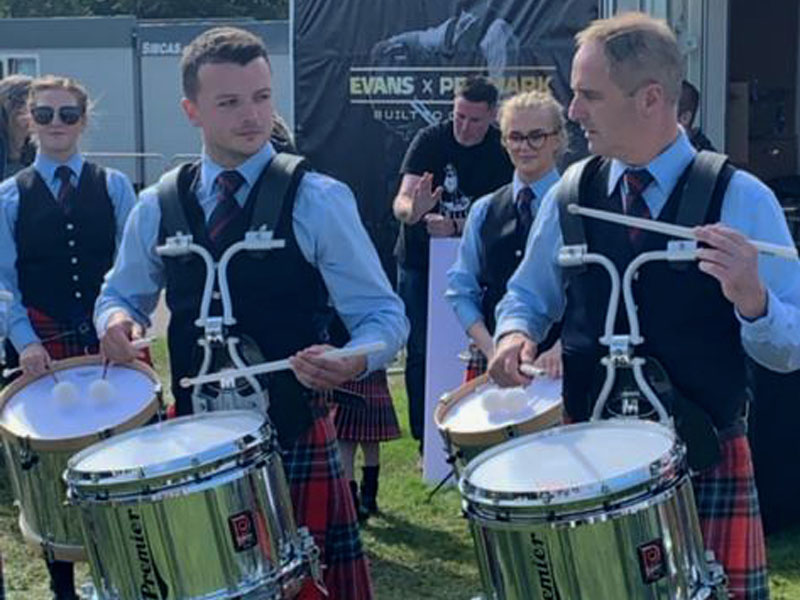
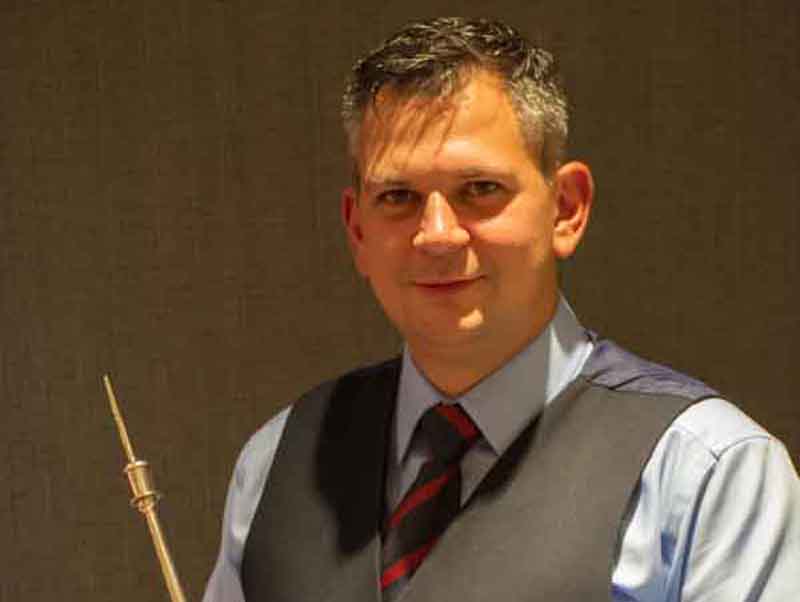
I love pipe bands, and there are some great bands out there. Field Marshall has been my favorite though, for nearly 30 years, ever since I heard their Medley at the 1995 Worlds,
In 2001 I finally got to hear them live at the European Championships in Ayr. The contest was held on the Green, next to the bay in Ayr. Most of the top Grade 1s were there, and sounding fantastic. Numerous Seagulls were divebombing the circle throughout the contest. When Field Marshall marched on for their Medley, the first thing I noticed was that the tone went up a notch, even above all the other spectacular sound I had been hearing. At first I thought it was just my personal bias, but then I noticed that the Seagulls, which had been swooping in over every band were now swooping down and going AROUND the Filed Marshall circle, like there was suddenly an invisible barrier over the band. A couple of brave bird made it through, but just a couple. Even the birds could sense the difference. Maybe a visual representation of the, “fuzzy bubble,” we all know can happen when it’s all going right.
After the contest I marched right up to PM Parkes, introduced myself, and congratulated him on a great performance. I’m a nobody in the piping world. Just an Amercian tourist that day for sure. But, he was gracious, and kind. He thanked me, and I got a little smile. That meant a tremendous amount to me.
I have photos of them marching off with their first prize. And somewhere I have a recording I made on one of those terrible little microcassette recorders. Now that PM Parkes has retired I will dig that out and give it a listen.